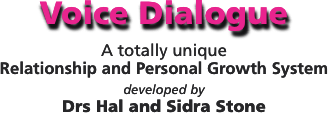Issue 5 August 2003
DREAMS: GOD’S FORGOTTEN LANGUAGE
by Hal Stone, Ph.D. and Sidra Stone, Ph.D.
We have always been fascinated by the dream process. We enjoy following it as it weaves between the sacred and the profane and between the conscious and the unconscious with great ease. It has played- and continues to play – a major a role in our own personal relationship and in our professional work. Dreams often give us information, inspiration, and healing that are not available to us in our waking lives.
In the Voice Dialogue video series, we spend two hours discussing the dream process with Michael Rowland. In our most recent book, PARTNERING, we devote a chapter to discussing the different kinds of dreams that are commonly seen when people begin to pay attention to their dreams.
In most of our current training programs, participants receive each other’s email addresses and are encouraged to send their dreams to one another even before the training begins. The participants, themselves, respond to these dreams if they feel so inclined. This process begins a few months before the program, continues during the program, and usually goes on for a few months afterwards.
The result is a rich tapestry of material from the unconscious; everyone is able to see the remarkable changes in personality that occur in relationship to these dreams and the work that has been done.
In a recent program one of the participants sent to us a copy of a very powerful dream that she had – and she told us of a very powerful experience that went with it. We were very moved by this dream and wanted to share it with you because it demonstrates the healing power of the unconscious when this deeper part of our spiritual nature becomes activated.
The dreamer was in her mid forties. Her daughter had died the year before at the age of 21. Needless to say, this was a crushing experience, and in the year that passed she had grieved this death very deeply. It seemed at some level to be an unsolvable grief. She sent us the following dream. (We have made some minor changes because English was her second language.)
I had this dream when I was sleeping alone in Maria’s bed (my daughter who died in 2001 of cancer ). I felt the need that night to sleep separately from my partner because I felt a strong need to be alone and have my own space. So I moved over to the room where my daughter had slept and went to sleep in her bed. In the night I had the following dream.
Maria is sleeping in this bed that I am also lying in. I see her breathe and her breathing is very quiet and peaceful. Suddenly I realize that I am inside Maria’s body. I can feel what she feels. She is sleeping very quietly and peacefully and I could feel and taste this quiet energy. I see that this energy is very big in her — a big and wonderful and peaceful energy. I see wondrous things through Maria’s eyes. I can’t find words to describe this experience I was having. In the dream I am feeling what she feels.
Then I realize that Maria is going towards Source. She finally is finding what she expected to find all the time in her life. Then I am out of her body watching her again and I realize that she has really died. I realize that she is at peace and with Source at the same time. I wake up at this point and feel both frightened and full of wonder at what has happened to her and to me.
One can only stand in awe at the power of the unconscious, the wondrous nature of the Dream Master who rules our sleep and dreams. God works in many different ways and along many different paths. In dream work we watch this intelligence of the psyche at work, moving us always to a deeper sense of ourselves. How else could such a deep tragedy be resolved than to be given the chance to experience with and within your child the peace of death as the newly packaged energy system moves towards the light and source of the universe.
It is our job to become aware of the selves that populate our inner world. We must become aware of them and learn to use them from a new place within us. Invariably out of this process the dream process become clearer and more understandable in a much shorter period of time than we could possibly imagine. All dreams aren’t as dramatic as this one, but once this Intelligence is activated inside of us, the hand of God is most assuredly at work.


